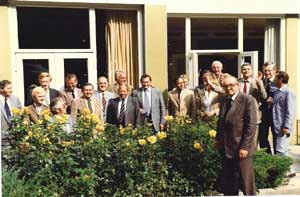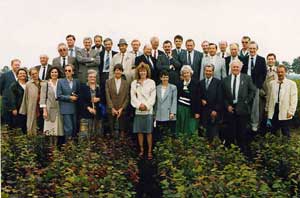History
After the Second World War forest nurserymen in Western Europe began to renew the contacts which they had had pre-war but they experienced problems over seed supply and trade barriers. After the Treaty of Rome these trade barriers began to reduce but the new European laws started to influence their activities. Nurserymen from Germany, France, Holland, Italy and Belgium began meeting annually on an informal basis but with the knowledge that the European Commission was proposing to introduce a Directive covering the genetic quality of forest plants in the six European Economic Community countries it was decided to formally establish a Committee that could represent the views of the private nursery sector of the whole Community.
The Committee was formally constituted in Cologne, Germany in 1962 and Fm. a. D. Robert Rahte was elected President and Mr Streitberger as Secretary, both from Germany. The Committee was immediately involved in discussions over the drafting of Council Directive 1966/404 on the genetical quality of Forest Reproductive Material marketed in the Community. It was later consulted during the preparation and adoption of Council Directive 1971/161 on the physical quality of Forest Reproductive Material.
At that time the Committee met up to three times a year but in later years it has met only once a year. Meetings rotate round member countries but during the long drawn-out preparation of the revised Council Directive 1999/105 meetings were regularly held in Brussels to facilitate the attendance of European Commission staff for consultation. In the early years discussions took place in German and French and translations were made between the two languages of all discussions and documents circulated. When Denmark, Ireland and the UK joined English was adopted as the third language. This continued until the year 2000 when English became the one official language of the Committee.
 A break during the Committee meeting in Rellingen, Germany 1982
A break during the Committee meeting in Rellingen, Germany 1982
Robert Rahte served for 16 years as President of the Committee and on his retrial he prepared a short history of the first 16 years of the Committee copies of which are available in German or French from the Secretary.
Mr Streitberger served as Secretary until 1971 at which time Helmut Astinet of Germany took over. He carried out the duties of Secretary for over 20 years and was succeeded by Dr Andy Gordon, UK, in 1993.
The following table lists the venues and dates of the meetings and gives the names of the eight Presidents of the Committee over the 44 years since it was founded.
President Robert Rahte, Germany
1. Cologne, Germany 22nd June 1962.
2. Brussels, Belgium 22nd/23rd October 1962
3. Paris, France 15th/16th February 1963
4. Scheveningen, Holland 18th/29th May 1963
5. Rome, Italy 26th/27th September 1963
6. Brussels, Belgium 13th/14th February 1964
7. Hamburg, Germany 10th/11th September 1964
8. Paris, France 24th/26th May 1965
9. Venice, Italy 28th/29th September 1965
10. Breda, Holland 2nd/3rd August 1966
11. Berlin, Germany 25th/28th January 1967
12. Brussels, Belgium 24th/25th May 1967
13. Brussels, Belgium 18th/19th January 1968
14. Paris, France 19th/20th September 1968
15. Amsterdam, Holland 29th/30th May 1969
16. Bonn Bad Godesberg, Germany 7th/8th October 1971
17. Naples, Italy 27th/28th September 1972
18. Paris, France 28th/29th May 1973
19. Munich, Germany 22nd/23rd October 1974
20. Padua, Italy 9th October, 1975
21a. Brussels, Belgium Meeting of Spokesmen only 2nd February 1978
21. Brussels, Begium 23rd May 1978
President Henri Naudet, France
22. Amsterdam, Holland 19th/20th September 1978
23. Brugge, Begium 19th September 1979
24. Nice, France 15/16 September 1980
25. Aberdeen, Scotland 7th/10th September 1981
President Robert Leemhuis, Holland
26. Pinneberg, Germany 12th/14th September 1982
27. Brussels, Belgium 5th/7th September 1983
28. Brussels, Belgium 11th September 1984
29. Brussels, Belgium 10th September 1985
President Andrew Gordon, UK
30. Brussels, Belgium 20th/21st August 1986
31. Brussels, Belgium 21st/22nd September 1987
32. Breda, Holland 4th/6th September 1988
33. Brussels, Belgium 12th/13th September 1989
Brussels, Belgium meeting of Spokesmen only 20th September 1990
34. Brussels, Belgium 16th/17th September 1991
35. Brussels, Belgium 17th/18th September 1992
President Hubert Vanhulle, Belgium
36. Brussels, Belgium 9th/10th September 1993
37. Brussels, Belgium 3rd June 1994
38. Brussels, Belgium 9th June 1995
39. Brussels, Belgium 17th June 1996
40. Brussels, Belgium 16th June 1997
41. Brussels, Belgium 15th June 1998
42. Brussels, Belgium 14th June 1999
President Ralf Köther, Germany
43. Edinburgh, Scotland 3rd/4th June 2000
44. Vienna, Austria 23rd/24th June 2001
45. Bordeaux, France 8th/9th June 2002
46. Stockholm, Sweden 13/14th June 2003
47. Orense, Spain 11th/12th June 2004
48. Hamburg, Germany 10th/11th June 2005
President Klaus Natlacen, Austria
49. Kilkenny, Ireland 9th/11th june 2006
50. Helsinki, Finland. 15-17th June 2007.
51. Stratford-upon-Avon, England. 6-8th June 2008.
President Vincent Naudet, France
52. Prague, Czech Republic. 5-7th June, 2009
53. Århus, Denmark. 11-13th June, 2010
54. Budapest, Hungary. 10-12th June, 2011
President Léon Faassen, Netherlands
55. Venlo, Netherlands 8-10th June 2012
56. Potsdam, Germany 7-9th June 2013
57. Edinburgh, Scotland 6-8th June 2014

In years when the Committee met away from Brussels, wives sometimes accompanied the delegates. Here they were specially invited to a special meeting organised in Breda, Holland in September 1988 for the Committee to meet representatives from the European Commission and to demonstrate to them the intricacies of growing forest plants.
As the Community has expanded, so the new member countries have been invited to participate, first as non-paying observers then on payment of an annual subscription as voting members.
At the annual meeting of the Committee in June 2005 in Hamburg, Germany it was unanimously decided to change the name of the Committee to a more easily remembered name with a simple acronym. To this end the name was changed to the European Forest Nursery Association with the acronym of EFNA.
At the 2007 meeting it was decided to appoint two vice Presidents to ensure continuity for the future. France was chosen to provide the First Vice-President and the Netherlands the Second Vice President.
